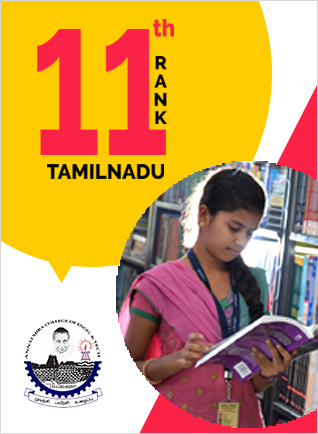- Email: [email protected]
- Mobile: 94433 04963
- Online Grievances
- Careers
- Contact Us
- Follow Us:
Admissions Hotline - 99523 87017
MBA – Master of Business Administration
Master of Business Administration (MBA) is one of the most popular post-graduate courses in India and abroad. For most managerial-level jobs across domains and sectors, an MBA degree is a necessity which is why, nowadays a large number of BTech, BBA, BCom, BA, BSc, BCA graduates opt for MBA in post graduation. The growing number of businesses has highlighted the importance of this professional course. It teaches the necessary skills required to expand a company or lead a successful business. MBA course also develops leadership skills among the students.
The Department of Master of Business Administration (MBA) at Annai Mira College of Engineering and Technology was established in 2023. Designed to provide a dynamic and industry-oriented learning experience, the department offers a comprehensive curriculum that blends theoretical knowledge with practical exposure.
With a strong emphasis on innovation, leadership, and strategic thinking, the MBA program at Annai Mira College equips students with the necessary skills to excel in the competitive corporate world. The department boasts experienced faculty, state-of-the-art infrastructure, and a holistic approach to management education, ensuring that students are prepared to tackle real-world business challenges.
Through industry collaborations, guest lectures, and hands-on projects, the department fosters an environment that encourages critical thinking, problem-solving, and professional growth. Whether aspiring for corporate leadership roles or entrepreneurial ventures, students of the MBA department at Annai Mira College graduate with the confidence and expertise to make a significant impact in the business world.
VISION
Empowering Tomorrow’s Business Leaders, Globally.
MISSION
To provide a transformative MBA education that ignites innovation, fosters, ethical leadership and cultivates a global mindset propelling our graduates to shape the future of business.
CORE VALUES
Excellence. Innovation. Ethical Leadership. Global Perspective.
PROGRAM EDUCATIONAL OBJECTIVES (PEOs)
Graduates can
- PEO-01:To have a thorough understanding of the core aspects of the business
- PEO-02:To provide the learners with the management tools to identify, analyze and create business opportunities as well as solve business problems.
- PEO-03:To prepare them to have a holistic approach towards management functions.
- PEO-04:To inspire and make them practice ethical standards in business.
PROGRAM SPECIFIC OUTCOMES (PSOs)
Graduates should be able
- PSO-01:To prepare graduates to design business solutions for practical challenges encountered in a variety of businesses while adhering to professional ethics and social responsibilities.
- PSO-01:To prepare graduates who will contribute to societal progress and development by making entrepreneurial decisions and leading businesses around the world.
PROGRAMME OUTCOMES (POs):
On successful completion of the programme,
- PO-01:Ability to apply the business acumen gained in practice.
- PO-02:Ability to understand and solve managerial issues.
- PO-03:Ability to communicate and negotiate effectively, to achieve organizational and individual goals.
- PO-04:Ability to understand one’s own ability to set achievable targets and complete them.
- PO-05:Ability to fulfill social outreach
- PO-06:Ability to take up challenging assignments
MBA - Master of Business Administration - Highlights
| Course level | Postgraduate |
| Duration | 2 years |
| Eligibility | students from any background - Science, Commerce and Humanities - can pursue it. |
| Average Fee | 50,000- 1,50,000 yearly |
| Average Salary | 4 lakh to 8 lakh annually |
| Admission Criteria | Based on merit |
MBA - Master of Business Administration Syllabus
In the below table, the syllabus of Professionals with CA/CS/ICWAI and other degrees can also pursue MBA are given:
| First Semester | Second Semester | Third Semester | Fourth Semester |
|---|---|---|---|
| Statistics for Management | Quantitative Techniques for Decision Making | Strategic Management | Project Work |
| Management Concepts and Organizational Behavior | Financial Management | International Business | - |
| Managerial Economics | Human Resource Management | Professional Elective I | - |
| Accounting for Decision Making | Operations Management | Professional Elective II | - |
| Legal Aspects of Business | Business Research Methods | Professional Elective III | - |
| Information Management | Business Analytics | Professional Elective IV | - |
| Non-Functional Elective | Marketing Management | Professional Elective V | - |
| Indian ethos (Seminar) | Business Ethics (Seminar) | Professional Elective VI | - |
| Business Communication (Laboratory) | Data Analysis and Business Modeling (Laboratory) | Creativity and Innovation Laboratory | - |
| - | - | Summer Internship | - |
MBA - Master of Business Administration Placement Trends
If we see the placement in MBA over the last few years, we will see that there is an exponential growth in placement.
- Many multinational companies recruit MBA graduates.
- The average starting salary package offered by the company is around 3-10 lakhs per annum and the highest salary package offered is around 15 lakh annually.
The highest-paid salary offered to the graduates of MBA is around 15 lakh per annum. The top companies that recruit MBA graduates are FMCG- ITC, HUL, P&G, IT/ITES- TCS, HCL, ZOHO, Accenture, Infosys, IBM, Amazon, Microsoft, Adobe, Cognizant, Deloitte, Netflix, Microsoft, Oracle, Wipro, etc.





